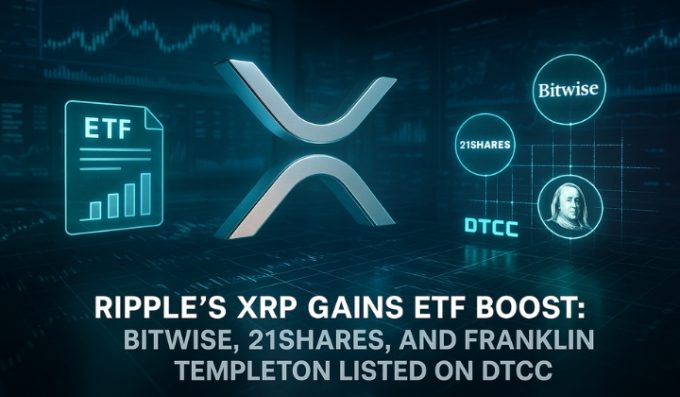Thinking of investing in Bitcoin ETF can be as complicated and confusing as going through a maze of complexities and the unknown. The crypto market is famous for its unpredictable and weird structures, making it difficult for many to deal with. As the crypto world was filled with confusion, the availability of Bitcoin ETFs(Exchange-traded funds) became a beacon of simplicity and accessibility.
Providing investors with a convenient avenue to Bitcoin ETF, these investment products simplify the process of crypto exposure without requiring investors to understand the complicated dynamics of cryptocurrency exchanges. This detailed guide strips off the veil of mystery on the subject, ensuring that the reader gets all the information about the workings, pros and cons and ultimately how Bitcoin ETFs affect investors. But, before getting deep into the Bitcoin ETFs, let’s discuss in detail what exactly ETFs are.
What is an ETF?
ETFs are different investment funds that are traded on stock exchanges and which copy the performance of the specific asset or group of assets, such as stocks, commodities, or cryptocurrencies. ETF investment involves advantages such as diversification, liquidity, and cost-effectiveness due to their inherent capability to provide exposure to multiple assets with lower expense ratios as compared to mutual funds.
ETF stocks, which in turn are bought and sold on stock exchanges, are the way that investors own part of the ETF’s underlying assets. They are of high liquidity and can be done on a trading day while making a diversification of a portfolio attractive due to which they are able to provide broad market exposure with ease of trading.
Deconstructing the Underlying Asset:
Spot vs.Futures-based ETFs:
Anatomy of an ETF
For investors who want to participate indirectly in the Bitcoin market without being faced with the intricate issues related to crypto exchanges, Bitcoin ETFs, as a solution, present an attractive alternative. In addition to knowing how the three factors interact, it is very important to determine the environments that support these vehicles. Let’s embark on a journey to dissect the key players and internal workings of a Bitcoin ETF.
The Orchestra of Expertise
The Bitcoin ETF plays a fundamental role in the Bitcoin ecosystem by providing a regulated and secure platform for institutional and retail investors to allocate their capital. The ETF ecosystem involves key players fulfilling specific roles:
- Issuer: Plot the investment strategy, manage the scheme on regulatory basis and run the business.
- Custodian: One of the features for financial institutions is the protection of their assets in the most secure way.
- Auditor: Separate trust overseeing body through audits and examinations.
- Authorized Participants (APs): Enable the issuance and repurchase of shares with sufficient liquidity and the ability of the market to operate smoothly.
Unveiling the Building Blocks: Learning about ETF Units.
- Basket of Assets: This diversified approach represents the pillar of the ETF. The Bitcoin Fund could hold actual Bitcoin, futures contracts as well as a combination of the two. The investor is thus exposed to the price movements of the basket as a whole by owning just one ETF unit.
- Creation/Redemption Mechanism: This dynamic duo creates a smooth transition for investors as they move in and out of the pool. Redemption and creation mechanism permits AP to deliver a portfolio of assets to the issuer with a view to getting new ETF shares, whereas the redemption mechanism gives the investor the ability to exchange the shares for the underlying assets.
The key disparities between blockchain and Bitcoin exchange-traded funds (ETFs) lie in their investment focus and asset composition. Blockchain ETFs target companies leveraging blockchain technology, offering stability as they invest in stocks rather than cryptocurrency. In contrast, Bitcoin ETFs directly hold Bitcoin or invest in its futures, making them more volatile due to direct exposure to cryptocurrency markets and price fluctuations.
Investment Implications:
Considerations:
- Liquidity: Though Bitcoin ETFs are likely to have higher liquidity in comparison to investing directly in Bitcoin, the trading volume may differ among the respective ETFs.
- Tax Implications: Investors should consider the tax implications of investing in Bitcoin ETFs, including capital gains taxes and differences in treatment compared to owning Bitcoin directly. The IRS treats cryptocurrencies as property for tax purposes. Transactions may trigger capital gains or losses.
- Regulatory Environment: The SEC approved the first US-listed Bitcoin ETFs. However, the SEC and other regulators have expressed caution about cryptocurrencies and related products.
Beyond the Basics: Exploring Alternative Investment Choices
While Bitcoin ETFs offer a convenient way to gain exposure to the digital gold, they’re not the only game in town. Let’s delve into alternative investment options like Bitcoin trusts and compare their mechanics to ETFs:
Final Words:
Bitcoin ETFs present a great innovation to the crypto sector, providing investors with a regulated and user-friendly way to invest in Bitcoin. Investors should be completely aware of the modus operandi, advantages, disadvantages, and consequences of Bitcoin ETFs. Taking into account such factors and keeping oneself abreast with all the market happenings, investors can successfully approach the intricacies of Bitcoin ETF and thereby make sound investment decisions. To stay ahead with the latest events and information related to the crypto industry, continue exploring 3.0 verse.
You need to login in order to Like













